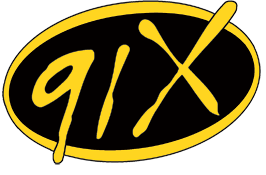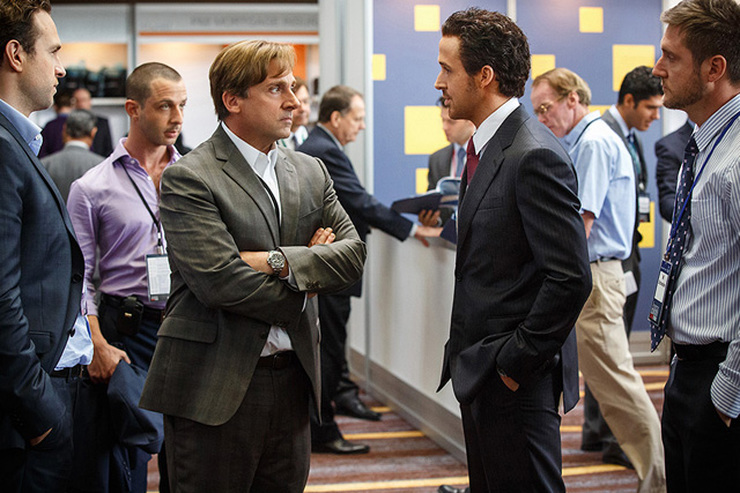I’ve always been suspicious and skeptical of alleged financial professionals who, at the end of the day, rationalize gambling with my money to enrich themselves. The last guy I seriously spoke with in the financial services industry gave me unsolicited advice about who to vote for, then energetically recommended I invest in Russian oil as I sat stunned in his office.
Funny thing is, it turns out not too many people who actually work in the banking or investment sector have a clear idea of what they do either, beyond varying levels of greed and the basic vocabulary and tools of the trade.
That’s according to the new film adaptation of Michael Lewis’ 2010 book The Big Short, about the causes of the 2007-08 subprime mortgage meltdown and worldwide recession, which nearly did in the world economy as we know it.
Directed by frequent Will Ferrell collaborator and Funny or Die co-founder Adam McKay, The Big Short is a very funny and frequently shocking film. Tightly scripted with dozens of ringing notes of truth, it displays none of the inane humor and runny improvisation of McKay’s earlier movies with Ferrell like Anchorman or Talladega Nights, which too often wasted comedy-rich concepts and ran peripheral ideas into the ground without ever fully utilizing the original concept for laughs (admit it, the funniest scene in Anchorman is the rumble with Tim Robbins’ crew of public broadcasters). Not so here.
McKay has long been a critic of Wall Street and especially the 2008 government bailout of the financial sector, which enabled the same banks and institutions which caused the financial meltdown to survive into the Obama years without having to be broken into pieces or made to atone for their sins. The Great Recession ultimately put six million Americans on the street, and cost eight million Americans their jobs.
Those who obsess over the alleged purity of the “free market” and “letting the market decide” are often silent on how the U.S. government — ideally, the best hope for a level playing field — came to the rescue of banks with the requirement that the money given to them “trickle down” into investments in the hopeful, Reaganesque supply-side definition of the term. And what happened? The banks sat on the money, of course, and paid themselves huge bonuses while the nation continues to recover from the effects of the recession in which the middle class is now more myth than reality.
But it wasn’t a war or natural disaster or arch-criminal that caused the crash. It was a corrupt institution of short-term rewards with zero interest in comprehending its own data, unwilling to turn off the gravy train spigot, unwilling to end clearly dangerous practices, and a lack of federal oversight after seven years of brutal budget cuts intended to pay for the 2001 and 2003 tax cuts that left regulatory agencies understaffed and wildly unable to address the problem. As the movie points out in one passing vignette, federal employees were often biding their time in oversight jobs until they could land a “real” job with a large bank or financial establishment.
But it was Big Money, and a willful lack of understanding among those in Big Money of the nuclear bomb capability of subprime mortgages, that caused the disaster. As the movie notes with an anonymous quote: “Truth is like poetry, and most people f___ing hate poetry.”
There were, however, smaller players within the financial world who were doing their due diligence and taking action — ostensibly to enrich themselves, but in part because no one else was willing to see or believe that the train hurtling at them head-on was on the same track. For the believers, the numbers didn’t look right at all, yet financial institutions couldn’t conceive of mortgages being at all risky. “The price of real estate always goes up, right?” “You’re going to do better next year with money, right?” “That’s not how we do things at Merrill Lynch.” The characters veer from nervous to sheer terror at how right they may be, and what the reality of a mortgage implosion would do — and did do — to the nation and the planet.
Some financial professionals could see the crash coming as early as 2005, like Christian Bale’s portrayal of Silicon Valley broker Michael Burry, who began to shield his investors from the coming calamity by “shorting” the market. Betting against the validity of subprime mortgage bundles, the socially awkward Burry is nearly laughed out of the room at Goldman Sachs by smug Wall Street financiers who agree to sell him credit default swaps against subprime deals which Burry identified as risky. The Goldman Sachs team can’t believe their luck.
A similar deal Burry negotiated with Deutche Bank, one of the market’s primary advocates of toxic collateralized debt obligations (CDO), clues in an aggressive Deutche Bank financier played by Ryan Gosling, who opts to play both sides of the fence. In doing so, he brings in a brokerage team led by Steve Carell (in a role based on real-life money manager Steve Eisman) that already has a reputation of hostility toward the market on a good day.
But after getting out of the bubble of Wall Street and doing their own boots-on-the-ground recon in the hinterlands of Miami’s mid-decade McMansion building spasm in a neighborhood that just as easily could have been Temecula circa 2008, Carell’s team finds the situation is even worse than they imagined at their most cynical, hardened moments.
Brad Pitt, an executive producer on the film, also makes several brief appearances as a mentor and money guru to two goofy but perceptive newbies in the financial world, who come across a copy of Burry’s diagnostics and research, and similarly do their own homework and become rich in the process — with the obligatory, “at what cost” added.
The film also utilizes several unexpected cameos and frequently breaks the fourth wall to add additional context at just the right moment to help the audience follow the dialogue-heavy action. The writing really stands out. What could have been a mess of a script with a multi-part story is instead clear, streamlined, and effective.
The Big Short is a comedy on the surface, but it’s also a fascinating drama of a moment of paramount ignorance for the U.S., an opportunity lost to right wrongs, and a warning that we are in the same place today as we were 10 years ago and have learned nothing.
Keep your eyes and ears peeled for the ghosts of financial cretins past in The Big Short: Washington Mutual, Merrill Lynch, Bear Stearns, and of course Lehman Brothers, whose demise sounded the end of the financial world’s mortgage distortions for one, brief moment. Lehman even lied to their own people, right to the end, from the top down — as stunned traders file out of the building in one of Wall Street’s biggest disasters, they’re sternly warned by corporate sycophants not to speak to the press even as the firm’s flaws have been laid bare for all to see.
No insult is too cruel to hurl at Big Money at this point.
Keep an ear out too for the closing song on the film’s soundtrack, a wholly appropriate number from Led Zeppelin that ominously, perfectly ties the sordid tale together.
Do your money homework. The Big Short is good cinema and a labor of social responsibility from director Adam McKay. It deserves a Good Citizenship Award.


